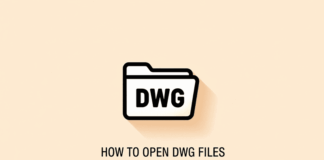Came across a file with a .C or .CPP extension and don’t know how to open it? These files contain programs written using the C or C++ programming languages. The .C file extension is a derivative of the C programming language, while the .CPP file suggests a source code that is written in C++.
In this guide, you’ll learn what C and C++ files are, how to open them, and how to convert them if needed.
What is a C File?
The .C files comprise the source codes for C or C++ programming languages. They often contain part or all of a program’s source code.
The C and C++ programming language is often used in the development of computer applications, operating systems, databases, network drivers, and more. So, chances are only programmers and developers are likely to encounter a C file.
To open a C++ file and make changes to the code, you need a compatible file viewer or code editor. It should support features like syntax highlighting, code folding, word wrap, line numbers, and formatting rules. Once you’re done editing, you can save the changes as a .c or .cpp file.
Note: Some systems use lowercase .c for C files and .C or .CPP for C++ files. Don’t confuse it with CFile, which is something different and related to Microsoft Foundation Class.
How to Open C/C++ Files?
You can open and read C or C++ files using basic text editors or full-featured IDEs.
Recommended Text Editors:
- Notepad++
- TextMate
- Sublime Text
- Emacs
These are lightweight and ideal for quickly viewing or editing the code without consuming many system resources.
Recommended IDEs:
- Microsoft Visual Studio
- Code::Blocks
- Dev-C++
- Eclipse
- CLion
While editors like Notepad++ or TextMate are great for viewing and minor edits, full IDEs such as Visual Studio or Code::Blocks offer advanced features like syntax highlighting, real-time debugging, code suggestions, and compiling support, making them a better choice for development.

For Lite-C script files, you’ll need the Lite-C program specifically designed for that format.
How to Convert C/C++ Files
Most of the time, there’s no need to convert a C/C++ file unless you’re switching languages or need to share it in a different format.
For starters, you can always create conversions within the source code itself including char array, string, integers, and more. But these are often restricted to the language itself, without making any changes to the file type. For assistance with your programming, you can always look out to resources at Stack Overflow.
But, you can actually convert your .C file into TXT or HTML format using any text editor. The only catch is that you won’t be able to use them as source codes with any IDEs whatsoever, without the compatible file format.

Similarly, you can also use a source code converter such as Tangible Software Solutions to directly convert your source code to another programming language. For example, you can easily convert C++ codes to Java, C++, or VB. Just bear in mind that with the free edition, you can only convert for a limited line of code.
You may also like our articles on How to Open PY Files and How to Open Zip File on Any Device.
Frequently Asked Questions
How to create a C file?
You can create a C file using any IDE such as Code::Blocks, Dev-C++, Visual Studio, and more. The easiest way to create a C file is using Windows Notepad. Simply write your C code and save your file type with the .c extension. You can then compile it using any C compiler.
How to create a header file in C/C++?
The C/C++ comes with pre-existing header files which you can use. Similarly, you can also create a user-defined header file. For that, simply create your header file, and save it using the .h extension.
I am unable to access C/C++ files. How can I fix this?
Sometimes, you might confuse .c files with other file types. If you can’t open a .c file, double-check the extension. It could be a .csh or .cab file instead. Also, .cs files are for C# code and not related to C or C++.
The Bottom Line
That’s how you can open, view, and convert C and C++ files. Whether you’re a beginner or just exploring old project files, the tools mentioned above will help you access and edit them with ease.












